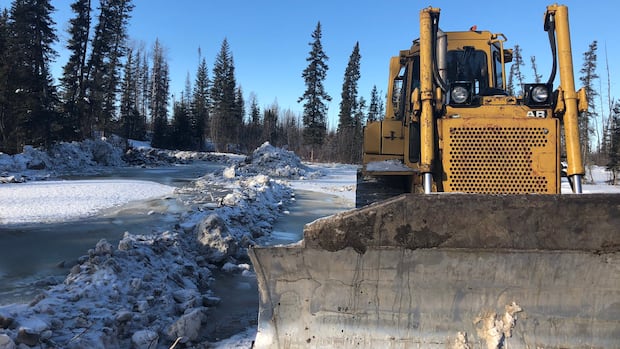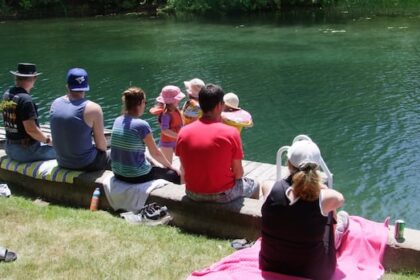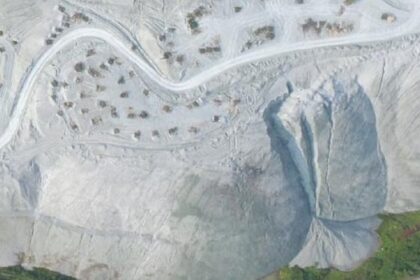NorthThe N.W.T. government has been promoting the Mackenzie Valley Highway as worthy of federal investment and fast-tracking. But the road would primarily serve a small population, and with an estimated price tag over a billion dollars, an economic case for it may be difficult to make. Territory’s MP doubtful as ‘it is a highway in just one jurisdiction’Sidney Cohen · CBC News · Posted: Nov 28, 2025 6:00 AM EST | Last Updated: 5 hours agoListen to this articleEstimated 5 minutesThe audio version of this article is generated by text-to-speech, a technology based on artificial intelligence. A construction vehicle sits at the site of an overflow on the Mackenzie Valley winter road in March 2019. The proposed all-season Mackenzie Valley Highway would run between Wrigley and Norman Wells, N.W.T. (John Last/CBC)There are new questions about the future of the long-sought Mackenzie Valley Highway project in the N.W.T., after the territory’s MP suggested that it may not be the best fit for Ottawa’s new Major Projects Office. “As it is a highway in just one jurisdiction — it’s not the Major Projects Office,” said MP Rebecca Alty, who is also minister of Crown-Indigenous Relations, at a news conference in Yellowknife last Friday. “What’s really needed for Mackenzie Valley Highway is the financing.”By contrast, she said, the territory’s proposed Arctic economic and security corridor, which the prime minister has identified as a priority, comprises a deep-sea port and a highway between two territories and would require the involvement of many more parties. Here, said Alty, “the Major Projects Office can be that convener to bring everybody together to get it across the finish line.”Prime Minister Mark Carney has said the Major Projects Office is intended to push forward large infrastructure projects deemed to be of national importance. The N.W.T. government has been promoting the Mackenzie Valley Highway — along with the Arctic economic and security corridor and the Taltson hydro expansion — as a project worthy of federal investment and fast-tracking.But the road would primarily serve a small population, and with an estimated price tag of $1.65 billion, an economic case for it may be difficult to make. The proposed 321-kilometre all-season gravel road would run between Wrigley and Norman Wells, N.W.T. The project is currently under environmental assessment.’The Sahtu’s open for business. We want to do business. We want our children to prosper and we want to open the doors for them,’ said Charles McNeely, chair of the Sahtu Secretariat. (Luke Carroll/CBC)Its supporters say the road would help ease the high cost of living in the Sahtu, reduce dependence on increasingly unpredictable ice road and barge seasons, and open up the region to mineral exploration.“We want exploration to happen,” said Charles McNeely, chair of the Sahtu Secretariat, the organization responsible for implementing the Sahtu Dene and Métis Comprehensive Land Claim Agreement.“The Sahtu’s open for business. We want to do business. We want our children to prosper and we want to open the doors for them.”’It is purely public infrastructure’But Graeme Clinton, a Yellowknife-based economist with Impact Economics, said that without a clear “economic windfall” at the end it, the highway is a tougher sell. “There isn’t sort of a pending resource development project, or any major project, that might flow from this investment, so it is purely public infrastructure,” he said.Economic arguments for the road aren’t as clear-cut or guaranteed as those for projects already on the federal government’s list of “nation-building” infrastructure, he said. Those other projects generally come with “a clear private sector opportunity that’s already been well identified, researched, and in most cases proposed.”Indeed, the Mackenzie Valley Highway may never be economically viable, said Clinton. The more compelling argument, he said, is that it could benefit an underserviced region of the country where costs are very high.According to the N.W.T.’s minister of Strategic Infrastructure, the uncertainty over resource development that the road might stimulate is a reason for the federal government to support it. “When the Trans-Canada Highway got built, did we know what would be the end results of that? When the CP rail line went through, [could] you predict what kinds of economic potential that would bring? Of course not…. You cannot guarantee those kinds of things. That’s why they don’t get built by a private company, they get built by governments,” said Minister Caroline Wawzonek.Caroline Wawzonek, N.W.T. minister responsible for strategic infrastructure, energy and supply chains, says the federal government has put money toward the highway, incrementally, over the years, but that this method of funding isn’t cost effective or efficient. (Liny Lamberink/CBC )“I can’t guarantee you which of these minerals or projects will move forward. I can’t. I can guarantee that if there’s no transportation corridors, and no movement on our energy solutions, there will not be a project. There will not be a mine, there will not be gas, the economics won’t happen, tourism will stay stalled, and we will continue to be a have-not. That can’t go on.”The federal government has put money toward the highway, incrementally, over the years, she said, but this slow drip of funding isn’t cost effective or efficient.Wawzonek met with the Major Projects Office CEO, Dawn Farrell, last Friday. She said the conversation centered on how the territory’s three big proposed projects could fit together to “unlock… the potential of the North.”Farrell never indicated that any of the N.W.T.’s proposals would be ineligible for fast-tracking by her office, said Wawzonek.The Major Projects Office did not provide CBC News with an interview and declined to comment on potential projects.In emailed statements from MP Alty’s office, a spokesperson said that while eligible, the Mackenzie Valley Highway doesn’t necessarily need referral to the Major Projects Office to get built. They said it could be supported through federal funding pots like the Canadian Infrastructure Bank and the $1-billion Arctic Infrastructure Fund.Whatever the outcome, McNeely, with the Sahtu Secretariat, won’t be deterred.“They’ve been talking about the Mackenzie Valley Highway all-season road for over 50 years,” he said. “If it doesn’t happen, we ain’t gonna stop. We’ll talk for another 50 years about that.” ABOUT THE AUTHORSidney Cohen is a reporter and editor with CBC North in Yellowknife. You can reach her at sidney.cohen@cbc.caFollow Sidney on Twitter
Thursday, 5 Mar 2026
Canada – The Illusion
Search
Have an existing account?
Sign In
© 2022 Foxiz News Network. Ruby Design Company. All Rights Reserved.
You May also Like
- More News:
- history
- Standing Bear Network
- John Gonzalez
- ᐊᔭᐦᑊ ayahp — It happened
- Creation
- Beneath the Water
- Olympic gold medal
- Jim Thorpe
- type O blood
- the bringer of life
- Raven
- Wás’agi
- NoiseCat
- 'Sugarcane'
- The rivers still sing
- ᑲᓂᐸᐏᐟ ᒪᐢᑿ
- ᐅᑳᐤ okâw — We remember
- ᐊᓂᓈᐯᐃᐧᐣ aninâpêwin — Truth
- This is what it means to be human.
- Nokoma











